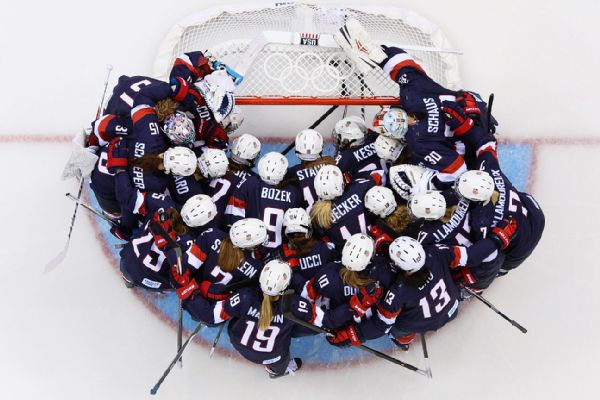
The U.S. women’s national hockey team reiterated Sunday night its willingness to settle its compensation dispute with USA Hockey and call off a boycott of the IIHF world championships that begin Friday in Michigan.
On the eve of a decisive conference call by the voting members of the USA Hockey board of directors, the U.S. women’s team urged them to uphold the terms of a working agreement the two sides thought they had reached in face-to-face talks last Monday in Philadelphia.
“We remain united in our resolve to bring positive change to the sport we love,” said the statement from the U.S. women’s team, which met Sunday night. “We are hopeful that at tomorrow’s meeting of USA Hockey’s Board of Directors, the members will agree to the terms that those at the negotiating table in Philadelphia saw as a reasonable path forward. Those terms reflected 15 months of negotiations and significant compromise by parties on both sides.
“We are incredibly grateful for the support we have received from the hockey community, professional players associations across the sports world, fans and beyond. Let’s seize this opportunity for the players and USA Hockey to make history together as we elevate the sport of hockey for everyone — girls, boys, women and men. This agreement has the potential to be a game-changer for everyone.”
Requests for comment to USA Hockey were not immediately returned.
Both sides find themselves in a difficult position heading into Monday’s vote. Neither can be certain of how the decision will go.
USA Hockey has taken a public relations beating during this fight, as the women outlined what they say are long-running inequities in travel, accommodations, meals, staffing, marketing support, wages and benefits compared to the men’s teams — not just the NHL players who play for USA Hockey on a spot basis at world or Olympic competitions. The two sides have also hotly disputed just how much additional the players are asking for.
Additionally, the federation has seen the women’s team pick up vocal support in the 11 days since the boycott was announced. The player’s unions of the NHL and National Women’s Hockey League, the NBA, Major League Baseball, the U.S. women’s soccer team, the Canadian women’s national team and Billie Jean King, among others, have issued statements supporting the women’s team.
At the grassroots level, everyone from men’s rec teams to NHL players, high school girls teams to far younger girls have posted social media photos in support of these images the national team put out last week, with hand-written signs of their own with words such as “Strong” and “United.” Many have used the hashtag #BeBoldForChange.
USA Hockey’s efforts to muster a replacement team in case the national team does not get a contract and does not show up to play have also been met with remarkably unified resistance. Attempts to recruit replacement players from the NWHL, colleges, post-college and high school ranks — even beer league teams — have been largely thwarted, with many of the targeted players granting interviews or turning to social media to reveal that they were asked to ignore the boycott but told USA Hockey no because they support the U.S. women’s team.
As of early Saturday evening, it was believed that as few as six replacement players had accepted the invitation USA Hockey was offering to report Wednesday to a “tryout” in Plymouth, Michigan, and play in Friday’s world championships opener against defending Olympic champion Canada if the national team didn’t show.
The boycotting U.S. team is the defending world champion and has won seven of the past nine world titles. It has never failed to medal at the Olympic Games since women’s hockey was introduced in 1998.
The optics of a federation warring with the jewel of its program have not been well received. Whatever team USA Hockey might field instead — if it can field a team — would have no more than 48 hours to practice and prepare for as many as five games over the next eight days.
Yet as difficult as things look for the USA Hockey’s efforts to make sure the tournament goes on, the boycotting players are facing great uncertainty too by refusing Thursday’s counteroffer.
When the federation’s team of negotiators and players parted last Monday, they were so optimistic that they had hammered out a working agreement after nearly 15 months of difficult talks, they shook hands and even exchanged some hugs. Both sides emerged from the 10-plus hours of talks characterizing the meeting as “productive” and “positive.” They said they believed they were on the path to moving forward together to grow the women’s side of the game.
But USA Hockey’s negotiators could not even convince their executive board to vote yes on the terms they brought back. So how will the 91 voting members of USA Hockey weigh in?
Things fell apart last Thursday, when the executive board, rather than approve the deal, voted to have its negotiators go back to the women’s team with a counteroffer that reduced the financial compensation the players would receive but kept significant other planks of the agreement in place, including the players’ request that any new agreement cover all four years of each Olympic cycle — not just the six-month training residency for which each player is paid $6,000 in the run-up to the Olympic Games.
So far, the U.S. Olympic Committee has publicly stayed out of the dispute. Spokesman Mark Jones declined comment again Sunday.
USA Hockey has continued to say throughout that it is committed to working out a solution with the national team it selected, rather than send a replacement team to the world championships. Whether the full board feels the same way will be determined in Monday’s vote.





